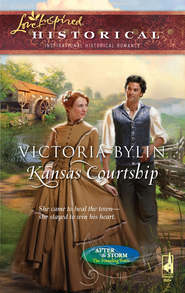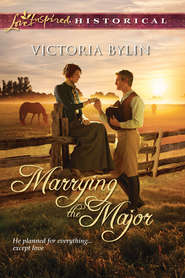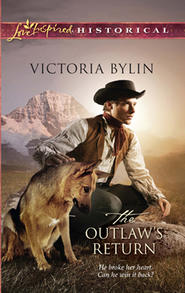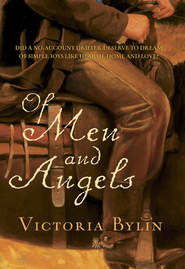По всем вопросам обращайтесь на: info@litportal.ru
(©) 2003-2024.
✖
West of Heaven
Настройки чтения
Размер шрифта
Высота строк
Поля
Handley stood and ambled to the pile of clothing. “I’ll give you a hand,” he said. “Are you looking for anything in particular?”
“Just being thorough. I’m looking for a letter, train tickets, anything.”
Handley kicked at a skirt with his toe. “If it’s any help, she and her husband were headed to Los Angeles.”
God bless you, Sheriff Handley.
“Then it looks like I’m on my way to California.” Rising from his knees, LeFarge coughed viciously, wiped his hands on his thighs and straightened his hat. “Gentlemen, thank you for your help. If Los Angeles doesn’t pan out, I may be back. Where exactly is your place, Mr. Trent?”
“About ten miles east,” Handley offered to Ethan’s chagrin.
“If you remember anything else, I’ll be at the hotel.” LeFarge extended his hand. The sheriff shook it as if he’d just met Wyatt Earp. Ethan shook it because he had no choice.
“It’s been a pleasure.” The outlaw tipped his hat and paced out the door.
Handley dropped to a crouch and stuffed the clothing back in the trunk. “Someone could use these things. Did you bring the wagon today?”
“It’s out front.”
“Would you mind dropping the trunk at the church? You can leave it on the steps. I’m sure Reverend Leaf will find it.”
“I’d be happy to help, Sheriff.” And even happier to have the widow’s possessions.
Handley put the last garment in the trunk, stood upright and shook his head with disgust. “That Dawson woman made me look like a fool when she ran off. The world’s better off without her kind.”
Ethan fought a powerful urge to set Handley straight about Mrs. Dawson’s character, but he didn’t trust the man. LeFarge had played his part well, and even with the letter from her husband, the sheriff was apt to lock her up. Ethan’s jaw tensed. He and the widow needed a new plan.
He picked up the trunk and followed the sheriff to the wagon. The lawman unlatched the tailgate and surveyed the supplies. “It looks like you’re stocking up.”
Ethan grunted. “I am. I hate coming to town.”
When the sheriff nodded and walked away, Ethan silently thanked Mrs. Wingate for wrapping the white cotton in brown paper to protect it from the dust in spite of his stupid explanation. He unwrapped the reins from the hitching post, climbed onto the seat and drove to the edge of town.
With its white clapboard sides and shake roof, the First Church of Midas resembled a New England farmhouse. He had been there once, exactly a year after he’d lost his family, but Reverend Leaf’s words about the seasons in a man’s life hadn’t done much good.
A time to weep, a time to laugh.
A time to mourn, a time to dance.
Ethan had left in the middle of the service and never went back, but that hadn’t stopped the Reverend from visiting his ranch every so often. Once he’d shown up with fresh-baked bread. They’d eaten it together, dry because they had no butter, and that night Ethan had cried himself to sleep. Sitting on the wagon, he wondered if maybe the preacher had been right.
A time to give birth, a time to die.
A time to tear apart, a time to sew together.
Clicking his tongue at the gelding, he drove past the empty churchyard with Mrs. Dawson’s trunk snug in his wagon. Only she wasn’t Mrs. Dawson anymore. She was just Jayne, and she needed his help. If the outlaw showed up, they needed to be prepared.
The thought of pretending to be married made Ethan’s heart thud with misery, but what choice did he have? To protect Jayne and her baby, he’d put up with just about anything.
Instead of finding his way back to the hotel, Timonius LeFarge took a window table at the restaurant across the street and watched as the rancher drove to the church. It made sense to donate a dead woman’s things to charity, but the rancher didn’t stop. Perhaps Ethan Trent had a wife…but the outlaw’s instincts told him otherwise.
LeFarge walked out of the restaurant without ordering and strode to the railroad depot while considering the events that had led to Jesse Fowler turning into Hank Dawson. Their last meeting had left Tim in a fury.
After discovering his ex-partner’s ruse in Lexington, Timonius had caught up with him in Midas where he’d learned that Mr. and Mrs. Hank Dawson were registered at the hotel. He’d gone to their room and told Jesse he had two choices: he could turn over the money or watch his wife die—right after Timonius took his pleasure.
To his credit, the kid had seen the wisdom of handing over the money. He’d told Tim that he’d gone straight and had deposited the cash in a bank in Albuquerque under his new name. They had taken off that night, but just before dawn the kid had gone for his gun. He’d missed, but Timonius hadn’t. Jesse had taken a bullet before galloping into the dark.
Tim hadn’t minded all that much. He’d learned to be all things to all people, and conning a bank manager sounded like child’s play. Except the fellow in Albuquerque had never heard of either Hank Dawson or Jesse Fowler. Timonius had been duped. He’d made his way back to Midas, asking questions along the way, but the widow had vanished into thin air.
The money had to be somewhere. The rancher might have taken it. Or maybe the widow and the rancher had formed an alliance…
Timonius thought about asking the sheriff if Ethan Trent was a married man, but if the answer was no, Handley would insist on riding with him to the Trent ranch.
As Timonius walked to the railroad depot, he weighed the possibilities. Either the widow was really dead and the money was waiting in Los Angeles, or the rancher had made it up as a ruse to throw him off track while she was near Midas waiting for the right time to go after it herself.
At the ticket window, a clerk peered at Timonius through his round spectacles. “Can I help you, sir?”
“When is the next train to Los Angeles?”
“Not for three days. We have a problem on the track down near Las Vegas.”
“One ticket, please,” LeFarge said.
The timing suited him perfectly. Three days was just enough time to pay a personal call on Ethan Trent.
Chapter Five
W hen she heard the rattle of the rancher’s wagon, Jayne climbed out of the warm bed, lit the lantern on the nightstand and peeked out the window. She saw him in the moonlight, sitting with his knees wide and his shoulders bent with fatigue, guiding the horse through the meadow.
It had been a hard day. The morning sickness had churned in her stomach until noon, and she had spent the afternoon wondering if being pregnant had sharpened her senses. She heard pine needles rustle and imagined LeFarge coming after her. When she pumped water, she recalled Ethan Trent’s rusty laughter. His smile had shocked her down to her toes. Behind that scruffy beard, she saw the hint of a handsome man.
The clatter of the wagon was louder now, so she went to the stove and stirred their supper. In spite of his meager supplies, she’d managed a batch of biscuits and a hearty stew from tinned meat and vegetables. It smelled good, and she wondered if the rancher liked to eat his food piping hot or if he preferred to let it cool a bit.
His wife would have known. Jayne could almost feel her fingerprints on the worn handle of the frying pan. The heart-shaped mirror must have been hers, too, but the rest of the cabin was untouched by a woman’s hands. Had Mrs. Trent died in childbirth or from an illness? Or perhaps she’d lost her life in an accident.
Jayne was certain that she hadn’t left her husband willingly. The woman had drawn stars next to the love sonnets in a well-thumbed volume of poetry. The Bible on the shelf held a mystery as well. Someone had written dates and initials by the simple verses taught in a child’s Sunday School class.
As the wagon rattled to a stop, Jayne picked up the lantern and opened the door. Light spilled into the yard, circling the rancher as he climbed down from the seat. Her gaze traveled from his muddy boots to his thighs to the hard line of his whiskered jaw. He was spattered with mud from head to foot.
Peering through the golden light, she said, “It must have been a terrible trip.”
“I got stuck a few times, but that’s the way of it.” He gave the horse a quick scratch on the neck. “Old Buck’s even dirtier than I am.”
She hung the lantern on a nail and walked to the back of the wagon. “I’ll help you unload. You must be starved.”
“I am.”
“I’ve got stew and—” Her fingers grazed varnished wood. “My trunk! How did you get it?” Her mother’s scissors. Her clothing. Letters and keepsakes. Trailing her fingers across the dark walnut, she said, “I can’t thank you enough, Mr. Trent.”











